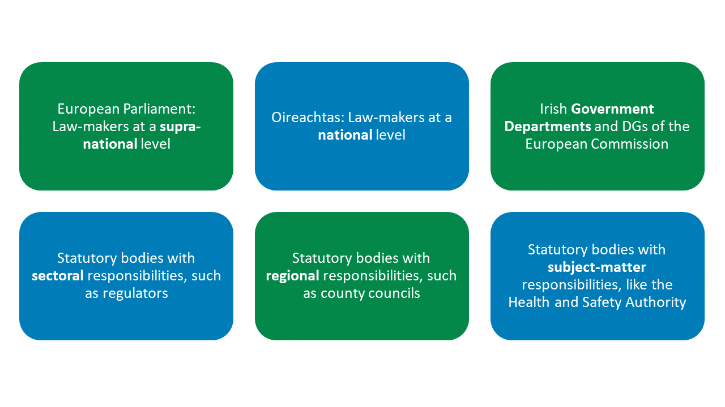
Why engage with policy?
Policymakers might find your research useful, and it’s possible that your findings can inform how policies are made, implemented and evaluated. You may seek to inform policy for a range of reasons, including but not limited to:
- Helping address an issue in society that you care about.
- Building links with policymakers, researchers, and other stakeholders, with a view to future collaboration.
- Improving the wider relevance of your research.
- Advocating for the value of scholarly research, strengthening the case for public funding.
- Building your reputation (as well as that of UCD and your colleagues).
- Helping shape the research agenda and set priorities (in Ireland and further afield).
Connecting with policymakers
Policies are formed in many different ways, and at many different levels. Some examples are presented in the image below, adapted from the (opens in a new window)Cambridge University Policy Impact Guide.

But the policy community extends far beyond those who directly make and implement policies — a sprawling network of people feed into the policymaking process, from politicians and civil servants to lobbyists and consultants. And there are just as many ways to influence and inform policies. For example, you could...
- Reach out directly to a civil servant, policy analyst, NGO, think tank, representative body or other policy actor working in your area. This is often the best place to start: an informal chat with someone who understands the policy area.
- Feed into Government consultations. Consultation responses from individual researchers often have less sway than joint responses from a group of experts, potentially through an interest group, representative body or learned society. So if you want to respond to a consultation, try to coordinate with other experts.
- Contribute to reports from interest groups.
- Apply for membership of the board of a relevant government agency or policy advisory organisation, such as the National Economic and Social Council or the Climate Change Advisory Council.
- Submit written evidence to a relevant Oireachtas committee.
- Speak at an Oireachtas committee meeting (although you’ll have to be invited to do so). Consider reaching out to the Committee Chair and position your research as part of the Committee’s ongoing work, and ask if you can be included as part of a hearing. If you’ve been invited to speak, and would like specific advice, feel free to contact public affairs colleagues at UCD Research or the Geary Institute for Public Policy.
- Correspond with TDs about your research and its policy implications.
- Engage in ongoing public debates, through social media or the mainstream media, for instance.
- Contribute to a political party’s manifesto.
The route you take will be unique, reflecting your expertise, the issue you’re trying to address, and the various groups and organisations involved in the policymaking process. Think creatively about the most effective way to engage with the policy community to give your research the best chance of making a difference. Identify the most relevant players, learn about their agendas and motives, and consider the timing of your input relative to where they are in the policymaking process.
For inspiration, take a look at some examples of how your colleagues have engaged with the policymaking process. And consider attending one of our training sessions or seminars to learn more.
Writing for policymakers
For the most part, policymakers rarely have the time or expertise to read traditional research outputs like journal articles or conference papers, relying instead on policy briefings, research syntheses, think tank reports, and so on.
If you’re in a position to create or contribute to a policy document, remember not to dumb down your findings or alter them to serve some political interest. A good rule of thumb is to assume you’re dealing with a non-technical audience, so present your research clearly and concisely, in simple language. But try not to provide a generic summary – make sure that what you write is tailored to your audience, whether they’re civil servants, practitioners, or government ministers. Help them see why your research is relevant to their agenda.
Asking yourself some of these questions may help your writing have a greater impact:
- Do my intended audiences have any competing priorities?
- What exactly do I want them to do? Can I make clear, specific, and workable recommendations to policymakers?
- Is there political will to take up my recommendations or do I need to adapt them?
- Can I work with other bodies to strengthen my argument?
Policy writing is complex, reflecting the fact that a host of competing voices – some seen and some unseen – ultimately inform policy decisions. The best way to learn how to write an effective briefing is to read some examples in the relevant policy area.
But remember, don’t stop engaging after you’ve submitted your policy paper or consultation response. It’s not always sufficient to distil your research into a written product. Your evidence alone is unlikely be enough to make a difference: you should try to build meaningful relationships with those you would like to inform. It is important that people have trust in your evidence, and in you as a researcher. For more information, read this chapter, by Professor Mark Reed of Fast Track Impact, on (opens in a new window)how to take a “relational approach” to engaging with policymakers.
With a quick search you will quickly find dozens of guides on how to write a policy brief, some of which are compiled on our resources page.
Monitoring public policy
You might find some of these sources useful for monitoring public policy in Ireland:
- (opens in a new window)Merrion Street provides news and updates from government.
- (opens in a new window)Kildare Street is an archive of what’s been said in the Dáil, the Seanad, and Committee meetings.
- (opens in a new window)Houses of the Oireachtas – you can sign up for alerts on This Week in the Houses of the Oireachtas, The Dáil Schedule, and the Committee Schedule.
Beyond that, keep abreast of policy issues in the mainstream media. But remember that these only represent a small fraction of the issues being grappled with by civil servants and other policymakers. For the most relevant and timely issues in your area, be sure to read specialists publications as well.